
Film fans have seen various visions of dystopia and its many hypothesized forms for decades. From Brazil to Equilibrium, from Logan’s Run to The Running Man, there’s no shortage of dismal looking futures. Yet as bleak as those titles paint their depicted worlds, The Hunger Games lets us know that hope and heart are still part of the human condition. But very much like our own society the aftermath still yields the ‘haves‘ and ‘have nots‘. In The Hunger Games the socioeconomic divides between The Capitol and The Districts are likened to the serf system of the medieval times. Yet the class split is much closer to home than some may realize. The next series of young adult novels to be adapted for the big screen (and into a budding franchise), the first leg in Susanne Collins’ popular trilogy hits swiftly and with the odds very much in its favor.
In the distant future, North America has fallen to ruin. What exists now it is the nation of Panem* – an opulent Capitol that governs the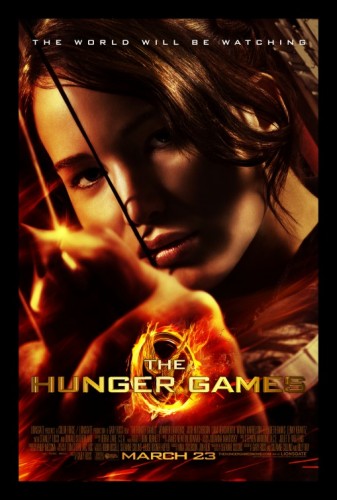 twelve outlying districts. Ruling with a mighty, albeit well-dressed and highly stylized, fist The Capitol keeps the districts (divided by the serf level of goods/materials they manufacture) in line by forcing them to send one boy and one girl to participate in the annual Hunger Games. In this televised form of elitist and aristocratic entertainment, the youngsters fight to the death on live TV. Katniss Everdeen (Jennifer Lawrence) and Peeta Mellark (Josh Hutcherson) have been chosen to represent District 12 and they face not only most-certain death but also feelings for each other which prompts the question: Survival or love?
twelve outlying districts. Ruling with a mighty, albeit well-dressed and highly stylized, fist The Capitol keeps the districts (divided by the serf level of goods/materials they manufacture) in line by forcing them to send one boy and one girl to participate in the annual Hunger Games. In this televised form of elitist and aristocratic entertainment, the youngsters fight to the death on live TV. Katniss Everdeen (Jennifer Lawrence) and Peeta Mellark (Josh Hutcherson) have been chosen to represent District 12 and they face not only most-certain death but also feelings for each other which prompts the question: Survival or love?
Jennifer Lawrence’s Katniss Everdeen, one of the 12-17 year-olds chosen in “the reaping” to fight to the death, is fierce but like all tweens is highly vulnerable. She’s used to fending for herself but anyone so outside their element is bound to be bewildered, nervous and frankly terrified. It’s that humanity in Lawrence’s delivery that leaps off the screen from this scarily believable future. So tangible in fact that it doesn’t take long for you to really care about her and Hutcherson’s characters and the choices they are forced to make to survive/win the games. As they’re thrust into the a game without any say in the matter, it’s kill or be killed. Sure we’ve seen it in literally every other movie but while you’d expect it in The Running Man there’s little remorse or guilt in the lead’s actions. Here, seeing the confusion, the tough choices and the consequences in the aftermath brings out levels of thick and endearing realism.
On a worldly level, the palpable realism in the The Hunger Games starts to make you wonder just how close we really are from the futuristic realistic indulgences of Panem. Really, it’s not that far fetched. We watch sporting events and also ludicrous amounts of reality TV. In The Hunger Games the two are merged in a way that harks back to the times of gladiators. Yet much like disposable forms of entertainment, watching even something as horrid as the deaths of teenagers has become socially acceptable (mandated is more like it) it’s comparable to watching any number of banal reality programs. The Hunger Games is like the Super Bowl but the tournament is not just entertainment. There’s something deeper and undeniably more human; it’s about intimidation, oppression and constant reminder that the Districts are living under the rule of the Capitol.
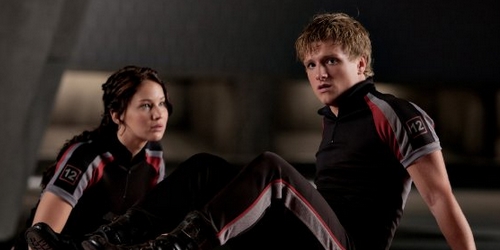
Lots of relevant and timeless social issues are woven into the subtext. Taking it even further and putting it on the playing field are the alliances created among the District’s tributes prior to the tournament. It’s not just one-on-one out there in the area, it’s about outnumbering, intimidation, pack mentality, etc but primarily survival. You have rich layered leads but can easily say the same for the villains and their supporting roles. All of these intricate elements no doubt come from Collin’s material but you have so much more depth to the characters, their mindsets and motivations than something like the Cullens or the wolf pack in Twilight. That said, and this may be attributed to the running time, we still only got glimpses of who the characters really are. It would have helped to know/see even more about Katniss, Peeta, Cinna, Haymitch as well as President Snow. Perhaps that’ll be the focus of the material in the sequels.
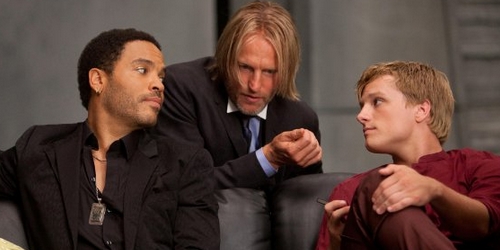
While Lawrence (Katniss) and Hutcherson (Peeta) are the stars/romantic leads they are lifted even higher thanks to a wonderful mix of supporting characters. Woody Harrelson as Haymittch (winner of an earlier Hunger Games tournament and now mentor to Katniss and Peeta) and Lenny Kravitz as Cinna (the Tom Ford-esqe image/publicity consultant) provide added layers of depth to the story giving advice preparing them for the games. Even someone like Stanley Tucci (playing a TV host who is equal parts Oprah Winfrey and Bruno Tonioli), who isn’t really out for their best interest is still, with his small inclusion, just another great Carnivalesqe back drop to play off. One thing that might have really put this over the top is a more driving and weighty score. The contributions from James Newton Howard and T Bone Burnett seemed to be holding back. Nothing was really underplayed but a film of this scale and grandeur might have benefited from, nay, almost requires a prominent musical theme a la The Dark Knight.
G-S-T RULING:
The Hunger Games is paced extremely well, with great foreshadowing and adequate character reveals/development, there’s not a whole lot to carp about. Gary Ross’ direction here is reminiscent what he did with Seabiscuit; he makes us care for characters in a world few will ever know. Further, he streamlines something so logistically epic but also manages to get a lot of material on screen without it feeling confusing, convoluted or bogged down. The result is something so well crafted and enjoyable that it most certainly will be one of the this year’s very best. This may be an extremely bold opinion but the level of quality existent in the story and the delivery on screen makes this film The Empire Strikes Back equivalent of young adult adaptations. It’s an intense, heartfelt and heart-stopping story. Only one thing can make this fantastic cinematic experience any better…the sequels.
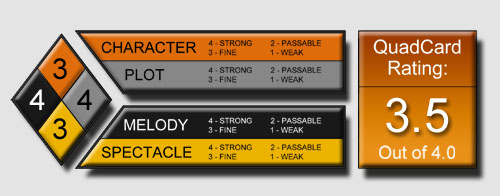
*To those new to the series, this area map below shows what Suzanne Collins imagined Panem (and the 12 Districts) to look like in her books.
(Click the image to see a full size hi-rez version)

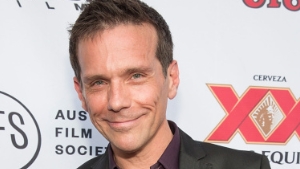
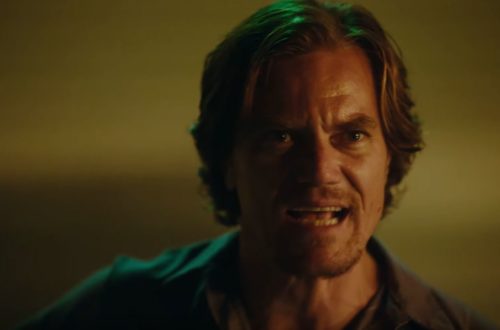
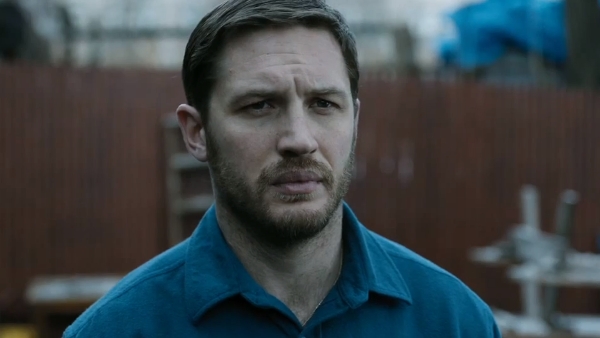
5 Comments
Kristin
Excellent review, Marc! So from reading this, I’m definitely going to assume that you’ve read at least the first book. Otherwise, you must have really done your homework and researched well because I could definitely tell that you had more than a basic knowledge after seeing the film.
Good point about all the layers and depth. I just saw the film last night, and personally, I would agree with you that as an audience, we definitely could have benefited more from getting to know the characters more, and their thoughts/motivations. I’ll be reviewing the film this weekend on my site.
Also – I’m definitely with you on the score. It was beautiful and fitting and brought a lot of it together. Will be buying that right about now 🙂
RidgeRacer4
Thanks Kristin! Actually no I hadn’t read the book but the few questions I did have were answered with the critics I saw this with (all 3 were huge fans of the book). But I’m going to now, I very curios to read this now. Case in point, all the “bread” flashback cuts. It was a sequence where only those who’ve read the books know what it was all about. Having been told I think it would have helped the film. I mean what 3 more minutes in a 2 1/2 hour movie right?:)
Jaina
I feel like I’m one of the only people in the world to not have been totally bowled over by The Hunger Games. I thought it was a fine film, but didn’t think it pushed enough into what could have been a more thought provoking film.
The direction, characters and look and feel of the film didn’t draw me into the Panem world enough.
Maybe I should have read the book first. But as a non-book reading viewer of this film, I’d say it was fine, just didn’t blow me away.
RidgeRacer4
I know exactly what you mean Jaina. I think I’m riding the high of opening weekend because initially when I got out of the theater I liked it and thought it was good but wasn’t in love with it. It’s only when I got more of the back story that I found it more appealing and things made a little more sense.
I guess I was expecting something even grander. Had this been the end of the story I’d agree it didn’t blow me away either. But to see this story expanded over the next two films makes me forgive any problems. All the same I’d definitively see it again and can’t say that for many movies that didn’t blow me away.
Andrew Crump
I think the movie’s biggest flaw is that it may actually be difficult for non-fans to get some of the important stuff going on here because Ross doesn’t translate all of it well. (For example, he really doesn’t at all explain why it’s significant for Gale to have entered his name in the Reaping 42 times, but that scene cuts so short that I wonder if there’s more to it that got left on the cutting room floor.) For the most part, I think he conveys what’s essential well, but little details mean a lot in the long run.
Like you, the social and political aspects popped for me. In fact I think they worked better for me than the games themselves did (though I didn’t dislike that part of the film by any stretch of the means). And Lawrence is truly spectacular here. She really matches her own excellence in Winter’s Bone, I think.